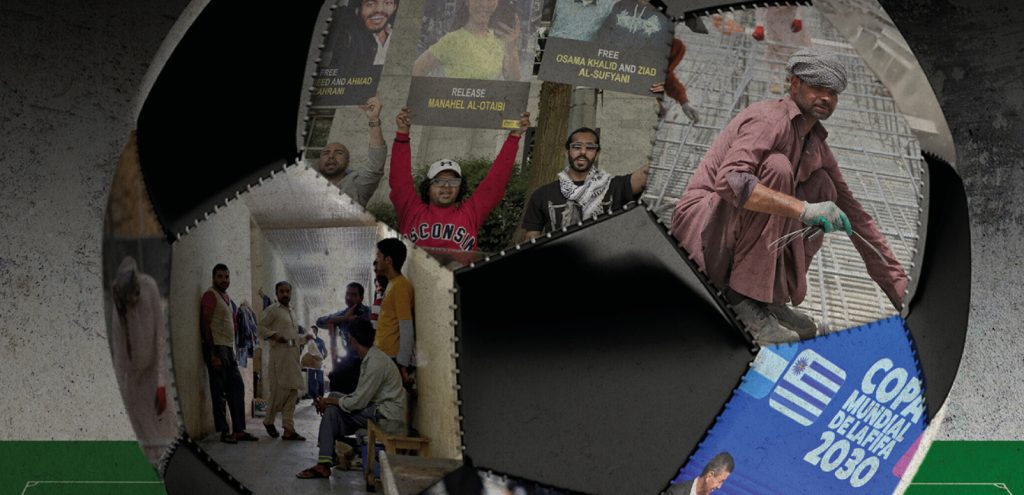
Amnesty International has urged FIFA to halt the process of awarding Saudi Arabia the 2034 World Cup until the country addresses significant human rights concerns. The call comes as FIFA prepares to announce the host nations for both the 2030 and 2034 World Cups, with Saudi Arabia’s bid being the only one under consideration for the 2034 tournament. Amnesty and the Sport & Rights Alliance (SRA) released a report on Monday detailing human rights issues related to the 2034 bid and urging the international governing body to ensure proper reforms before moving forward.
FIFA’s bidding process requires host countries to meet “internationally recognized human rights” standards, yet Amnesty’s report argues that Saudi Arabia’s bid has failed to adequately address these criteria. The organization stresses that while the 2030 World Cup, co-hosted by Spain, Portugal, and Morocco, also requires further human rights improvements, Saudi Arabia’s situation is more urgent. Amnesty concludes that the risks in Saudi Arabia are so severe that FIFA should suspend the 2034 bidding process until the country enacts meaningful reforms to protect workers and uphold basic freedoms.
A FIFA spokesperson told CNN that the organization is committed to thorough bidding processes and will release the “bid evaluation reports” for both World Cups ahead of FIFA’s Congress on December 11. FIFA also noted that its bidding procedures align with past World Cup selections, including the upcoming 2026 tournament in the United States, Canada, and Mexico, as well as the 2023 Women’s World Cup in Australia and New Zealand.
Saudi Arabia has made significant investments in sports and infrastructure in recent years and has ambitious plans for the 2034 World Cup. These plans include the construction of new cities, transport infrastructure, 11 new or renovated stadiums, and 185,000 new hotel rooms. On its official 2034 bid website, Saudi Arabia claims it has taken a human rights approach, promising to use the World Cup as a platform to promote human rights in the country.
However, Amnesty International’s report points out that the country’s labor practices remain deeply problematic. Steve Cockburn, Amnesty’s Head of Labor Rights and Sport, highlights that the 2034 World Cup will require a vast number of migrant workers for construction projects, yet there are no guarantees that the country will address the abusive “Kafala” sponsorship system. This system ties migrant workers to specific employers, leaving them vulnerable to exploitation, including wage theft, forced labor, and abuse. Although Saudi Arabia has announced some reforms to the Kafala system, rights groups argue that migrant workers still face significant power imbalances, with employers retaining disproportionate control.
Amnesty warns that awarding the World Cup to Saudi Arabia without credible reforms would lead to a “real and predictable human cost.” Workers would continue to face exploitation, forced evictions would occur, and residents may be displaced to make way for World Cup infrastructure. The organization also points out that women’s rights and LGBTQ+ rights in Saudi Arabia remain severely restricted. Homosexuality is illegal, and while the government has said it welcomes LGBTQ+ tourists, the country continues to criminalize same-sex relations. Additionally, freedom of expression remains severely curtailed, with many individuals imprisoned for their dissenting views.
FIFA has previously faced criticism for its role in “sportswashing,” a term used to describe when a country uses high-profile sporting events to improve its international image, often in an attempt to deflect attention from human rights violations. Saudi Crown Prince Mohammed bin Salman has dismissed these concerns, saying that he doesn’t care about accusations of sportswashing. Last year, Saudi Arabia’s sports minister also downplayed criticism of the country’s treatment of migrant workers, calling such claims “shallow.”
While much attention has focused on Saudi Arabia’s 2034 bid, Amnesty International also raised concerns about the 2030 World Cup. Although Spain, Portugal, and Morocco are set to co-host the tournament, Amnesty’s report notes human rights challenges in these countries as well. Specifically, it mentions the use of excessive police force, restrictions on free speech, and the possibility of forced evictions in Morocco due to large-scale infrastructure projects. Morocco’s bid includes plans for a new 115,000-seater stadium near Casablanca, which could result in the displacement of local communities.
In response, Amnesty’s Cockburn called on the governments and football associations of Spain, Portugal, and Morocco to take their human rights responsibilities seriously. He stressed that the 2030 World Cup could be an opportunity to strengthen human rights protections in these countries, provided that authorities work closely with human rights organizations, trade unions, and affected communities.
The Portuguese Football Federation (FPF) stated that their bid is based on strict adherence to FIFA’s principles and public requirements. The FPF also mentioned that they have conducted a study to identify and address human rights concerns related to the project, which will be included in the final bid dossier.
In conclusion, while FIFA is set to make its decisions on the 2030 and 2034 World Cup hosts soon, Amnesty International’s calls for reform highlight the importance of ensuring that major sporting events do not come at the expense of basic human rights protections. The organization insists that FIFA must take a stronger stance on human rights and halt the 2034 bid until Saudi Arabia shows credible commitment to reform.








